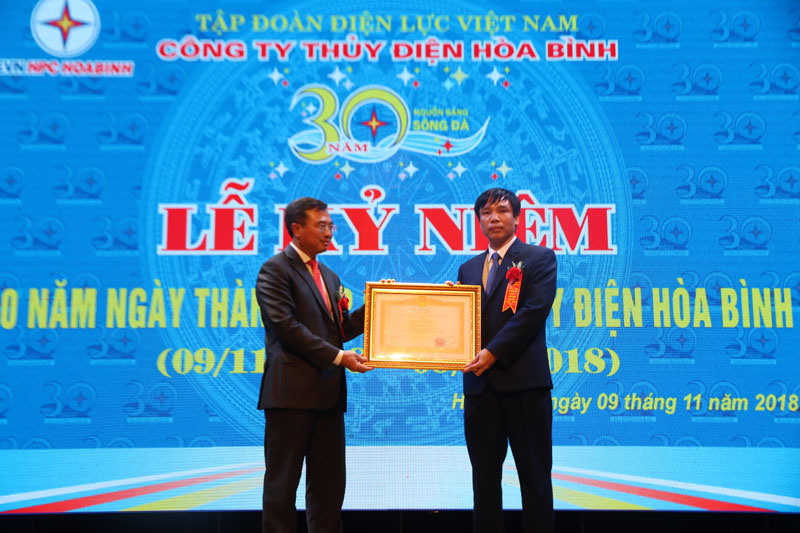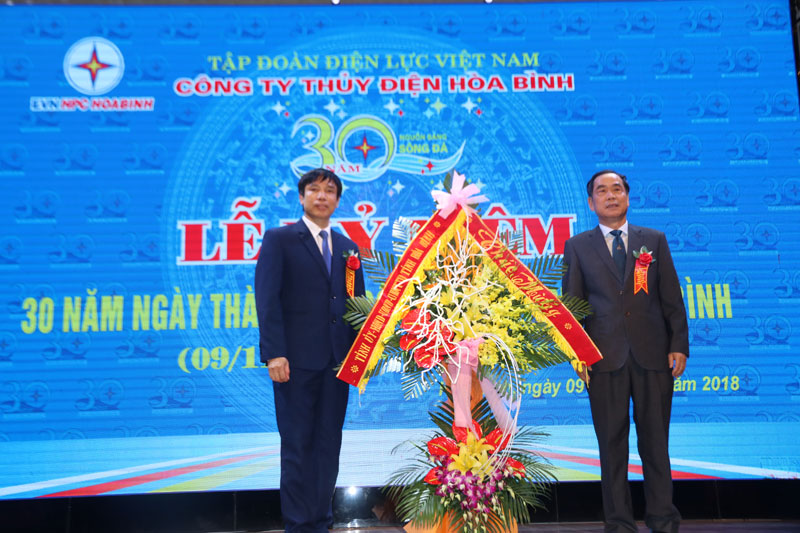
(HBO) – The Hoa Binh Hydropower Company has organised a ceremony to celebrate its 30th founding anniversary (November 9, 1988-2018), marking a path full of hardships and challenges to make the Hoa Binh Hydropower Plant, managed by the company, one of the largest hydropower works in the Southeast Asian region.
Attending the ceremony were Deputy Minister
of Industry and Trade Hoang Quoc Vuong, Chairman of the Member Council of the
Electricity of Vietnam (EVN) Duong Quang Thanh, Permanent Vice Secretary of the
Hoa Binh provincial Party Committee and Chairman of the provincial People’s
Council Tran Dang Ninh, and Vice Secretary of the provincial Party Committee
and Chairman of the provincial People’s Committee Nguyen Van Quang.

Deputy Minister of Industry and Trade Hoang Quoc Vuong presents the Prime
Minister’s certificate of merit to Hoa Binh Hydropower Company.

Chairman of the provincial People’s Committee Nguyen Van Quang presents flower
basket to Hoa Binh Hydropower Company on the occasion of its 30th founding anniversary.
To date, the plant’s accumulated electricity output has reached nearly 230
billion of kWh. Annually, the company contributes 1.2-1.4 trillion VND to the
budget of Hoa Binh province, and 300-450 billion VND in natural resources tax
to Son La province. It pays more than 200 billion VND in forest environment
service fees to six provinces in the upstream Da River per year, while engaging
in regulating floods effectively, ensuring safety for lower areas and
minimizing damage caused by downpours and floods.
Since the Hoa Binh Hydropower Plant was put into use, no flooding has been
recorded in the northern delta region, with sufficient water for agricultural
production during the dry season. In 2017, the plant was officially recognised
as an important work related to national security.
On the occasion, the Prime Minister presented a certificate of merit to the Hoa
Binh Hydropower Company for its outstanding achievements recorded over the past
years. In addition, two units and four individuals of the company received
certificates of merit by the Ministry of Industry and Trade./.
Hoa Binh province is undergoing a dynamic transformation amid Vietnam’s national digital transition. Building on Poliburo’s Resolution No. 57-NQ/TW on breakthroughs in science, technology, innovation, and national digital transformation, the province has rolled out a wide range of practical action plans. A standout initiative is the "Digital Literacy for All” movement, an effort to ensure that no one is left behind in the digital era.
Hoa Binh province is undergoing a dynamic transformation in the wake of the national digital transformation movement. Building on Resolution No. 57-NQ/TW of the Politburo on breakthroughs in science, technology, innovation, and national digital transformation, the province has implemented a wide range of practical action plans. A standout initiative is the "Digital Literacy for All” movement ambitious effort to ensure that no one is left behind in the digital age.
With a spirit of unity and proactive problem-solving, the Party Committee, the government and the people of Dong Lai Commune (Tan Lac District) have made great strides in implementing the resolutions of the 24th Party Congress of the commune for the 2020 - 2025 term. Focusing on leadership and practical actions, the commune has brought the Party’s resolutions into daily life, creating strong impacts and pushing the local development forward.
Amid the nationwide push for digital transformation, young people in Hoa Binh Province are stepping up as dynamic pioneers, applying technology to enhance Youth Union operations and expand the reach of youth-led initiatives. Through creativity and adaptability, Youth Union organizations at all levels have introduced a series of practical solutions, contributing to modern governance and community development.
In recent years, An Nghia commune, located in Lac Son district, has stepped up administrative reform, focusing on improving the quality and efficiency of its single-window service unit for receiving and processing administrative procedures. These improvements have helped create favourable conditions for local residents and organisations to handle administrative procedures, contributing to the commune’s broader socio-economic development.
The Prime Minister-approved master plan to develop the multi-use value of forests ecosystems through 2030, with a vision to 2050, aims to improve the management and sustainable use of forest resources, create jobs, increase incomes, and improve the living standards of ethnic minorities, people in mountainous and remote areas, forest workers and those living near forests.




